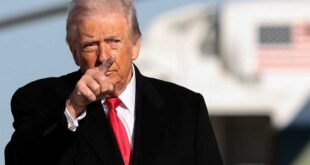An ambitious China and a changing American leadership will lead to significant changes in the relationship between the two countries over the next few years.
China has taken decisive action to entrench its position in Latin America, a region long neglected by the United States.
Just how seriously China takes the development was on display last week when President Xi Jinping personally attended the inauguration of the Chancay port on the Peruvian coast.
Xi was in Peru for the annual meeting of the Asia-Pacific Economic Co-operation Forum (APEC). But many of the representatives and leaders were focused on Peru and what it says about China’s growing assertiveness in the region.
With this inevitable development, Washington appears to be paying the price for years of neglect and lack of investment in its neighbors.
During their private meeting on Saturday at APEC, U.S. President Joe Biden pressed the Chinese leader on China’s unfair trade policies.
This was Biden’s third meeting with Xi, which took place after the American leader mistakenly called the relationship between the two countries an “alliance,” before quickly correcting himself.
“We are the most important alliance – or the most important relationship in the entire world, and how we’re getting along together can impact the rest of the world,” Biden said
“And so, our two countries cannot let any of this competition veer into conflict. That’s our responsibility and over the last four years I think we’ve proven it’s possible to have this relationship.”
Xi’s comments seemed directed not simply at Biden but at President-elect Donald Trump who will return to the White House for a second term on January 20.
“China is ready to work with the new U.S. administration to maintain communication, expand cooperation and manage differences so as to strive for a steady transition of the China-U.S. relationship for the benefit of the two peoples,” Xi said. “China’s goal of a stable, healthy and sustainable China-U.S. relationship remains unchanged.”
“Make the wise choice,” Xi suggested.
His comment to Biden was most likely directed at the incoming Trump administration. “Keep exploring the right way for two major countries to get along well with each other.”
Xi appeared to signal concern that Trump could create division between China’s
relationship with the U.S. when he takes back control of the White House, according to multiple outlets.
Biden and Xi discussed a range of contentious issues including the economy, cybersecurity, Taiwan, and Ukraine, for which Biden condemned North Korea for deploying thousands of military troops to Russia, according to the White House.
The two leaders also discussed the risks of artificial intelligence, nuclear weapons, and China’s fentanyl production.
Biden also confirmed that the U.S.’s “one China policy” remained “unchanged” and that the U.S. acknowledges the government in Beijing as the sole government of China.
The U.S. does not have formal diplomatic relations with the self-governing island of Taiwan, which China considers its territory.
China has called acknowledging Taiwan’s sovereignty a “red line” in its relationship with the U.S.
While Biden has previously pledged to protect Taiwan from a potential Chinese attack, on Saturday, he called for a continuation of the status quo.
Biden reiterated to Xi that the U.S. “opposes any unilateral changes to the status quo from either side, that we expect cross-Strait differences to be resolved by peaceful means, and that the world has an interest in peace and stability in the Taiwan Strait,” the White House readout said.
Biden also “called for an end to destabilizing PRC [People’s Republic of China] military activity around Taiwan.”
The next Trump presidency will see changes in the U.S.-China relationship.
China’s fentanyl production is an ongoing problem, and Trump is expected to press China hard on this pressing issue.
An estimated 223,000 Americans died from the mostly China-sourced drug in Biden’s first three years in office.
According to the National Institute on Drug Abuse, “In 2022, over 107,000 people died of a drug overdose, with 75% of those deaths involving an opioid. The overall rise in overdose deaths is largely attributable to the proliferation of illicit fentanyl, a synthetic opioid.”
Trump also pledged to protect U.S. manufacturing from Chinese competition.
Trump, 78, has threatened to renew his tariff-driven trade war with China, which during his first term, was waged in an attempt to broker a new economic pact that would benefit American companies.
Now he’s calling for a universal tariff of 10% to 20% on all imports into the United States from all countries and an additional tariff of 60% on all imports from China.
During his first term from 2017 to 2021, Trump oversaw a period of heightened tensions with China, including a trade war sparked by his imposition of tariffson Chinese goods.
China responded with its own tariffs and trade restrictions, though experts
warned that the escalation on both sides damaged the two countries’ economies.
“I charged China hundreds of billions of dollars in taxes and tariffs. They paid us,” Trump boasted at his final campaign rally in Grand Rapids, Michigan, on November 4.
“And you know what? We’re going to get along great with China. We’re going to get along good. I want to get along with them. President Xi was great until COVID came. Then, I wasn’t so thrilled with him.”
On Saturday, Xi appeared to extend a hand of friendship to Trump, encouraging their countries to work together for mutual gain.
“China is ready to work with the new U.S. administration to maintain communication, expand cooperation and manage differences so as to strive for a steady transition of the China-U.S. relationship for the benefit of the two peoples,” he said.
“China’s goal of a stable, healthy and sustainable China-U.S. relationship remains unchanged,” Xi said, and called for “mutual respect.”
“If we take each other as rival or adversary, pursue vicious competition and seek to hurt each other, we would roil the relationship or even set it back,” he added.
But Xi’s words will remain empty until he proves his true intentions.
For his part, Trump will need to decide to what extent he wants to wage war against China.
“I got along very well with President Xi. He’s a great guy. He wrote me a beautiful note the other day when he heard about what happened,” Trump said after the assassination attempt on him in July. “It’s a good thing to get along, not a bad thing.”
Trump’s actions speak louder than his words and he has only strained bilateral ties with China without achieving significant structural reforms in the country’s trade practices.
Trump’s ongoing focus on unilateral tariffs will only escalate tensions and disrupt global supply chains, hurting the economies of both countries.
 Geostrategic Media Political Commentary, Analysis, Security, Defense
Geostrategic Media Political Commentary, Analysis, Security, Defense





